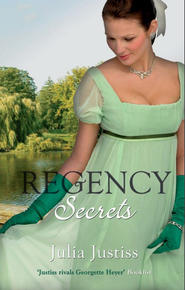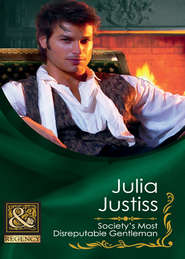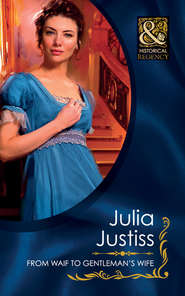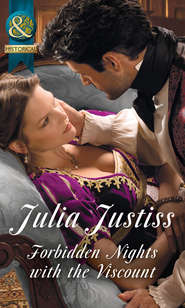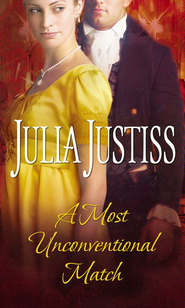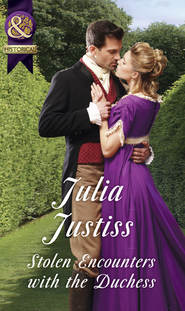По всем вопросам обращайтесь на: info@litportal.ru
(©) 2003-2025.
✖
The Untamed Heiress
Автор
Год написания книги
2018
Настройки чтения
Размер шрифта
Высота строк
Поля
ADDING THE BILL TO the stack on his desk, Adam Darnell dragged his fingers through his chestnut-brown locks. He’d almost rather be back with Wellington, preparing to charge the French lines, than here in London trying to figure out how to salvage his estate from the depravations suffered during his father’s long, ultimately fatal illness.
Perhaps he’d best accept the inevitable, follow his solicitor’s advice and find an agreeable heiress to marry. A rapid series of knocks on the library door pulled him from contemplating that gloomy prospect.
“Adam, may I come in?” The door opened slightly and his stepmother peeked in, the ribbons on her ruffled mobcap dancing. “I hate disturbing you, but ’tis urgent!”
Wondering indulgently what new crisis had occurred to distress his flighty relative—a lost pair of eyeglasses, a dead sparrow on the garden path—Adam rose and waved her to one of the wing chairs beside the desk. “Do come in, ma’am, and save me from dealing with this pile of bills.”
“Oh, those!” Lady Darnell waved an airy hand. “Burn them! ’Tis what your dear papa always did.”
Which was precisely why the estate was now in such disarray, Adam thought. Biting back so unfilial a reply, he said instead, “How can you be distressed when you look so charming? Like the sun itself in that fetching gown.”
Lady Darnell smiled and her china-blue eyes glowed. “Aren’t you the gallant one! I must say, the moment the dressmaker showed me the yellow silk paired with this blond lace, I knew it would be perfect for me.”
His widowed father’s second wife, previously the relic of a baronet of very large fortune, was hopelessly extravagant, Adam thought with an inward sigh. But so tender of heart and unfailingly cheerful of spirit that it would be as churlish as it was useless to chide her for her expenditures. Nor, with him away in the army, could he ever repay the debt he owed her for abandoning all her cherished London pursuits to remain beside his ailing father during his long, slow decline into death.
Such a sunny spirit didn’t need to be burdened with the details of debts and mortgages. He’d just have to make economies in other areas—and look for an heiress whose dowry could refill the family’s financial well.
“The matter is urgent,” his stepmother said again, recalling him to the present. “Please let me do the proper thing!”
“What is amiss?”
Lady Darnell held out a letter. “I’ve just received this from the solicitor who manages the property of my late cousin Diana, saying that her daughter, now orphaned, is on her way to London. He writes that it was Diana’s particular wish that the child come to live with me.”
Adam frowned. “Your cousin was the girl’s mother? Surely it is the directions left for her care in her father’s will that shall determine her guardianship.”
“I suppose, but that is a matter for the solicitors to resolve. In the meantime, the little girl needs a home.”
It sounded like a muddle that might require several weeks to work out. Still, housing a child for that short a time shouldn’t put too much additional strain on his purse. “Do you wish to take her in? I don’t want you to let a sense of duty force you into playing nurse-maid.”
“Oh, I should love to have her! But—” Lady Darnell hesitated “—before you agree, I must inform you that Diana was involved in a rather dreadful scandal some years back. Not that anyone should hold the poor child responsible, but you know how people are. With you on the look for a wife and Charis’s Season beginning, I shouldn’t want some infamy committed by a connection of mine to…limit your choices.”
“Then there’s nothing to worry about, as I’d not consider anyone who would hold the transgressions of a mother against her child. Nor, I am sure, would Charis. So how old is the girl, and when is she arriving?”
“Soon, the lawyer said. As to her age, I cannot say. You know I am hopeless with figures! After Diana and Vincent Lambarth married, he bore her off to the family castle in the wilds somewhere, and there she remained. Lambarth never again permitted her to come to London, not for the Season and not even to bring the child for a visit. So, although naturally one cannot condone what she did, ’tis hardly surprising, what with Lambarth keeping her a virtual prisoner in that dreary place. Right on the coast, ’twas bound to be excessively damp, do you not think?”
Adam’s lips twitched, but Lady Darnell was in such grave earnest, he resisted the urge to laugh. “Just what did this dampness lead her to do?”
“Well, first you must understand that in her debut Season, Diana conceived a passion for a most ineligible young man. Though ’twas nothing ineligible about his birth—the youngest son of Viscount Seagrave—but from his earliest years, he showed himself to possess the wildest, most ungovernable character. He was expelled from Oxford the spring Diana met him, and though Lambarth had been courting her for months, once she met Gavin, she had eyes for no one else. Her family tried to dissuade her, of course. Then after being challenged by a jealous husband, Gavin killed the man in a duel and was forced to flee the country. Diana was heartbroken. But Lambarth still wanted her, so she gave in to his urging and married him.”
“The union didn’t prosper.” And small wonder, Adam thought. What fool would torture himself by marrying a woman he knew loved another man?
“I suppose not. In any event, after more than a decade immured at Lambarth Castle, Diana…ran away. We heard she’d sailed in a fishing boat to Ireland, then taken ship to the Caribbean, where she joined Gavin at the estate he’d settled. Lambarth refused to divorce her, though, so they were never allowed to marry under English law.”
Lady Darnell paused, a pensive look on her face. “I sometimes wondered if she’d regretted leaving her husband, forced as she was afterward to live as an outcast and give up her daughter. We were close growing up, but when she married Lambarth, we lost touch.”
And what of the most innocent victim of this family tragedy? Adam thought. “The poor child.”
“Indeed. It must have been dreadful, losing her mama, then living so isolated before her papa died, as well.”
“And you want to comfort her?” Adam asked.
Lady Darnell gave him a tremulous smile. “It’s always been my greatest sorrow that I was never blessed with children. Not that you and Charis are not extremely dear to me, but by the time I married your papa, you were both nearly grown. Yes, I would very much like to care for my dear cousin Diana’s poor little daughter.”
This was not sounding like a “temporary” measure, Adam thought. Still, he could hardly fault his stepmother’s concern, and how much could a little girl eat? By the time she needed a wardrobe full of gowns and a dowry for her come-out, she’d either have moved on to her paternal relations—or he’d have the Darnell fortunes mended.
“So when do we collect this waif?”
A dazzling smile illumined Lady Darnell’s face. “Oh, Adam, I knew your compassion could not fail! I shall reply to the solicitor immediately to fix a time.”
Adam rose to escort his stepmother out. As he bent to kiss her fingertips, she pulled him close for a hug.
“Thank you, my dear,” she murmured. “Your kindness will be rewarded, I’m sure. A child is always a blessing.”
Recalling some of the exuberant students who had enlivened his sojourn at Eton, Adam made a noncommittal murmur. As his stepmother hurried out, he hoped the long-motherless child he was about to introduce into his well-ordered household would turn out to be a sweet, timid thing rather than an undisciplined hellion.
ONLY TWO HOURS AFTER FIRST learning of the orphan’s existence, Adam found himself driving his curricle into the city to the address supplied by Lady Darnell. To their surprise, the footman returning his stepmother’s note to the lawyer had brought back a second missive informing them the child had just arrived. However, as there were legal issues involved which might take some time to work out, Mr. Pendenning had suggested that rather than have Lady Darnell wait while the men un-tangled the niceties, the head of the household could come alone to fetch the girl.
And so, driving the open vehicle he hoped a child would prefer to the lumbering coaches she’d probably been shut up in during her journey and bearing the beribboned doll Lady Darnell had charged him to present as a welcoming gift, Adam prepared himself to spend the afternoon armwrestling with lawyers for the dubious privilege of adopting a child entirely unknown to him.
He certainly hoped his stepmother would be happy.
This unforeseen addition to his household underlined the imperative to get the Darnell fortunes in order, he told himself as he drove. But since he’d first considered the matter this morning, he’d had an inspiration that he hoped might spare him the humiliation of having to barter his ancient name and lineage for the hand of some newly rich cit’s well-dowered daughter. As long as luck and his old childhood friend Priscilla smiled upon him, anyway.
Having been abroad for the war with France and then having leased out Claygate Manor, the Darnell country estate that bordered her father’s lands, he’d not seen Miss Standish in some years. But she was still unmarried, he knew. If the plump, cheerful lass who’d loved to trail behind him on his youthful escapades, hanging adoringly on his every word, had not changed too much, he reasoned, he would have as much chance of finding marital harmony with her as with any of the other carefully coifed, capped and costumed chits about to be paraded on the Marriage Mart.
He’d have to look into calling on Miss Priscilla Standish as soon as he settled this business of the orphan.
Half an hour later he was escorted by a clerk to Mr. Pendenning’s private salon, where, the young man informed him, the lawyer would join him shortly.
Knowing there would be lengthy paperwork to sort out, Adam suppressed his irritation at the delay. The salon to which he’d been shown was dimly lit, the curtain of the single window drawn against the light. While his eyes adjusted from the bright sunlight of the brisk late-winter afternoon he’d just left, he scanned the room, his gaze settling on a newspaper left atop a side table.
He was striding to pick up the paper when a rustling noise in the corner of the room distracted him. His vision of welcoming a small, grieving moppet into the family embrace was shaken when what he’d dismissed as an assortment of black rags piled in a chair, suddenly unfolded its length and rose phoenixlike to face him.
The image of a woebegone child died altogether as the Creature approached. Sticklike legs and narrow bare feet protruded below a faded black gown more than a foot too short for her emaciated frame—which was nearly as tall as his own. Adam’s shocked impression was of a walking scarecrow, until the Creature halted before him and extended one bony hand.
The girl’s nose protruded beaklike from her thin face. With her sharp cheekbones, lusterless, tangled black hair and the feral dark eyes fixed intently upon him, Adam was put forcibly in mind of a bird of prey about to attack.
When the Creature’s lips curved into a mocking smile, he realized he’d been simply staring at her, mouth agape, his face no doubt clearly mirroring his thoughts.
Painfully conscious of having, for the first time in his almost thirty well-bred years, failed to summon polite words of greeting, he felt hot color flush his skin. Before he could get his lips working, the Creature withdrew the hand he’d not managed to shake and made him a curtsey.
“You must be Lord Darnell,” she said, her voice low-pitched and husky. “How…charming to meet you.”
CHAPTER THREE
THOUGH THE GIRL WAS the least attractive example of femininity Adam had ever beheld, her curtsey was graceful. Moreover, the sardonic look in those snapping black eyes and the irony in her greeting told him she was shrewd enough to have guessed what he thought of her appearance.
Rather than being embarrassed, though, she seemed to derive a scornful amusement from his discomfiture as he stood, still staring, the frilly doll in one hand.






